Monday October 25, 2021 | VICTORIA, BC
by Mary P Brooke, Editor | Island Social Trends
Today Premier John Horgan announced that British Columbia is launching “a stronger, more ambitious climate plan to deliver on its commitment to reduce climate pollution and build a cleaner, stronger economy for people throughout BC”.
The CleanBC Roadmap to 2030 plan accelerates measures in B.C.’s continent-leading climate plan that has been proven effective and introduces new ideas to help B.C. achieve the Paris emissions reduction targets for 2030 and reach net-zero by 2050.
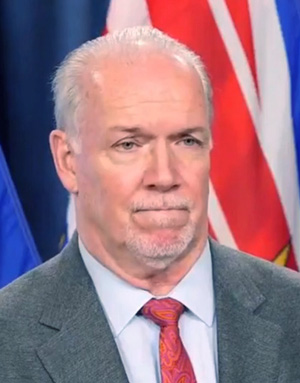
More specifically, actions in the roadmap will result in meeting B.C.’s legislated greenhouse gas (GHG) target of 40% below 2007 levels by 2030.
Threat is ‘today’:
“Here in B.C., the threat of climate change is no longer decades or even years away. The impacts are all around us, from devastating wildfires to intense heat waves and droughts,” said Premier John Horgan.
Horgan specifically referenced three of the last four summers being unprecedented for wildfires, as well as the heat dome which effectively caught the BC Government off guard (570 deaths were attributed by the BC Coroner as happening directly as a result of mostly older and/or lower-income people overheating in their homes).
“The scale of the climate emergency demands that we act with even greater urgency than ever before. By bringing people and businesses together, we can rise to the challenge and seize the opportunity to build a stronger, more resilient B.C. for everyone. That’s what this plan is all about.”
Making the shift more affordable:
The CleanBC Roadmap to 2030 builds on the progress British Columbia has made since 2018 by making polluting more expensive and the shift from fossil fuels to clean alternatives more affordable. The plan will help power more businesses and communities with clean, renewable made-in-B.C. hydro electricity. Working with large industry partners, it will also ensure sector-specific plans to reduce their climate pollution and meet B.C.’s targets.
Actions in the roadmap will result in meeting B.C.’s legislated greenhouse gas (GHG) target of 40% below 2007 levels by 2030.
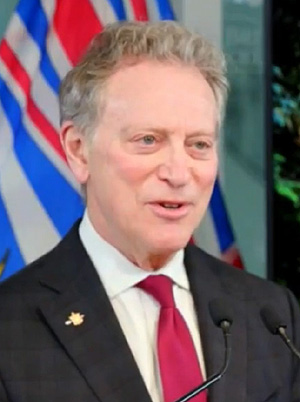
The CleanBC Roadmap was a commitment from last year’s Climate Change Accountability Report and was informed by new emissions projections showing greater action to meet its 2030 GHG targets was required.
Multi-sector approach:
“By working with all sectors, we can see clearly where we are making progress and where new thinking and resources are required,” said George Heyman, Minister of Environment and Climate Change Strategy.
“The CleanBC Roadmap puts greater focus on transitioning away from fossil fuels faster and adopting clean energy solutions. It strengthens B.C.’s position to attract investment and build opportunity for British Columbians and embodies our determination and commitment to meet our climate targets.”
No one left behind:
Today during a technical briefing with media (ahead of the public session), government officials said that the CleanBC Roadmap to 2030 includes income-tested opportunities for low- and middle-income consumers to be supported in making transitions to electric vehicles and home heating improvements.
Until now, many of the electric vehicle grants and subsidies have benefited consumers who already have enough financial resource to purchase a generally more costly vehicle than they already have.
As for home-heating, heating using electricity was at one-time heavily promoted in BC as affordable. Some homes — particularly rental units — are heated by baseboard heaters, which is now (due to many electricity rate increases over the years) one of the most expensive ways to heat a living area. Landlords and building owners will need to be looped into upgrades to heat pumps, if lower-income renters are to benefit on the cost of heating with electricity.
Broad Pacific region nudge:
Today Premier Horgan made sure to mention how a regional (cross-border) approach to addressing climate-change impacts is part of his scope in achieving better outcomes for carbon emission reductions.
In today mentioning the governors of Washington State, Oregon and California, Horgan is broadcasting BC’s appeal to nearby jurisdictions to be part of the larger solution. “It takes hard work and collaboration,” he said, right ahead of mentioning Washington Governor Jay Inslee, Oregon Governor Kate Brown, and California Governor Gavin Newsome.
Eight pathways:
The CleanBC Roadmap to 2030 includes a series of actions across eight pathways. They include:
- a commitment to increase the price on carbon pollution to meet or exceed the federal benchmark, with supports for people and businesses;
- requirements for new industry projects to have enforceable plans to reach B.C.’s legislated and sectoral targets and net zero by 2050;
- stronger regulations that will nearly eliminate industrial methane emissions by 2035;
- a comprehensive review of the oil and gas royalty system to ensure it aligns with B.C.’s climate goals and provides a fair return for British Columbians, with outcomes released in February 2022;
- new requirements to make all new buildings zero-carbon by 2030;
- a nation-leading adoption of zero-emission vehicles (ZEVs) by 2030 and 100% ZEVs by 2035;
- developing new ZEV targets for medium- and heavy-duty vehicles;
- an accelerated shift toward active transportation and public transit (30% by 2030; 40% by 2040; 50% by 2050);
- increased clean fuel and energy efficiency requirements; and
- support for innovation in areas like clean hydrogen, the forest-based bioeconomy and negative emissions technology.
Meeting targets:
“We made our oil and gas sectoral targets clear a year ago and this roadmap includes our commitments to meet that reduction target. We will work with experts, industry and Indigenous Nations on programs and policies that will achieve this, including regulation where necessary,” Heyman said.
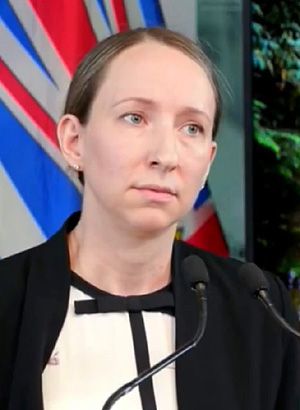
“The CleanBC Roadmap updates B.C.’s climate and clean economy plan to put the province on a path that will cut pollution in line with our emissions targets and support affordability for people and businesses along the way,” said Colleen Giroux-Schmidt, vice-president of corporate relations, Innergex Renewable Energy Inc., and co-chair of B.C.’s Climate Solutions Council.
“The plan incorporates extensive input from the independent Climate Solutions Council, and the challenge before us all now is to roll up our sleeves, harness all available resources and partners to ensure B.C. can navigate and thrive in the transition to a net-zero world,” said Colleen Giroux-Schmidt.
Seaspan leadership:
The CleanBC Roadmap was announced highlighting Seaspan Ferries recently completed pilot project supported through CleanBC to test the performance of biofuels in its cargo vessel, the Seaspan Reliant.
The company is also working on a project which will increase the size of the battery storage systems onboard two of its vessels by means of a new battery technology developed by Corvus Energy at its facility in Richmond.
“Seaspan Ferries is making great progress reducing emissions across our fleet and CleanBC has been an important part of that,” said Ian McIver, president, Seaspan Marine Transportation.
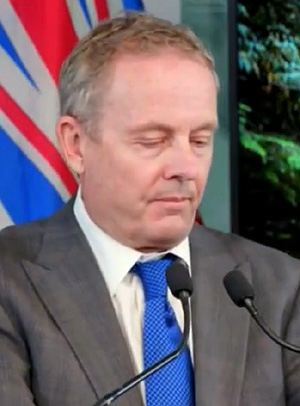
“This new biofuel and battery project has shown we can find innovative ways to lower greenhouse gas emissions and fuel consumption in our ships and get better engine performance and cost-savings. We’re confident the new CleanBC Roadmap will help us accelerate this transition and bring even more benefits.”
===== LINKS (provided by government):
What people are saying about the CleanBC Roadmap:
Jay Inslee, governor, State of Washington: “The CleanBC Roadmap to 2030 is a bold and necessary plan for stepping up to the climate challenge and making life better for British Columbians in the process. It will take all of us working together to meet the challenges of climate change and the 2030 roadmap demonstrates what is possible as we work together to build a clean, healthy and equitable future for our communities. Congratulations to Premier Horgan and the many people who came together to develop this critical roadmap and will drive it forward.”
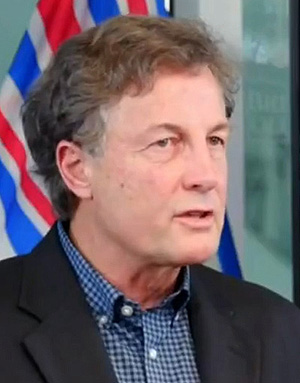
Mark Jaccard, professor, school of resource and environmental management, Simon Fraser University; member of B.C.’s Climate Solutions Council: “The CleanBC Roadmap significantly accelerates British Columbia’s climate plan through targeted actions across sectors that will put the province back on the path to meeting its climate targets. It includes a nation-leading law that will mean 90% of new cars and trucks sold in the province by 2030 are zero-emission vehicles, increasing to 100% by 2035. The roadmap takes a smart, cost-effective approach that will increase choices for people looking for cleaner options and supports affordability for people and businesses in the clean economy.”
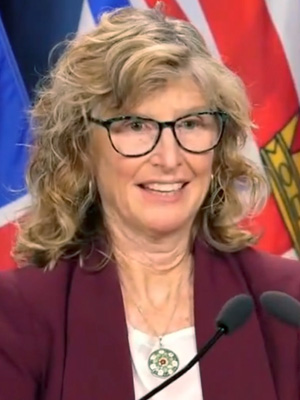
Merran Smith, executive director, Clean Energy Canada; co-chair of B.C.’s Climate Solutions Council: “The new CleanBC Roadmap sets the right course for British Columbia and puts B.C. among North American leaders, with strong policies to reduce carbon pollution in transportation, buildings and industry. B.C.’s oil and gas industry represents 20% of B.C.’s CO2 emissions and the roadmap, for the first time, provides a path for government to require the industry to reduce its emissions year over year. We must now act with swift implementation. While the world is transitioning to clean energy more quickly than ever, any good climate plan is also an economic plan. With the release of today’s roadmap, B.C. has a once-in-a-generation opportunity to link its economic and climate goals.”
Karen Tam Wu, regional director for British Columbia, Pembina Institute; member of B.C.’s Climate Solutions Council: “In this updated climate plan, CleanBC has closed the gap on its 2030 emissions reduction target with carbon footprint requirements for buildings, steps to put more zero-emission passenger and freight vehicles on the road and increased carbon pricing. We look forward to working with the Province to implement the policies in the roadmap, determine an appropriate role for gas, and develop an equitable and inclusive transition plan in line with the Province’s net-zero commitment.”
Andrew Weaver, professor, school of earth and ocean sciences, University of Victoria: “I am thrilled with the release of the CleanBC Roadmap that fulfils our original commitment in CleanBC to fully meet our legislated greenhouse gas emissions target for 2030. The roadmap’s comprehensive, sector-wide approach to emissions reduction leaves no stone unturned. It is a generational plan for future prosperity providing new opportunities for people and businesses. And it’s a plan that signals to the world that B.C. is going to lead the way in the transition to a low-carbon future.”
Tamara Vrooman, president and CEO, Vancouver Airport Authority, and chair, Canada Infrastructure Bank: “The CleanBC Roadmap is a bold and necessary plan that will guide industry and business toward a net-zero carbon future for all British Columbians. At YVR, this roadmap aligns with our ambitious climate and sustainability goals, which will see our operations become net zero by 2030. It will also enable our work with Musqueam and our many partners to advance green solutions for aviation and beyond, including exciting developments such as low-carbon aviation fuel. We applaud the Province of B.C. for this roadmap and look forward to helping lead the tangible results it will create.”
Blair Qualey, CEO, New Car Dealers Association of BC: “More people in British Columbia are discovering the benefits of electric vehicles, thanks to CleanBC incentives, including zero pollution, lower fuel and maintenance costs and a better driving experience. British Columbians are already adopting EVs at the highest rate in North America and the new CleanBC Roadmap will help accelerate this transition to a cleaner future and build new opportunities in the EV sector.”
Thomas Mueller, president and CEO, Canada Green Building Council: “In British Columbia, we have the skills and experience necessary to make sure all new buildings in B.C. emit zero carbon by 2030. B.C.’s green building sector is a leader in North America using innovative methods and materials to construct some of the highest quality, least polluting buildings and homes. The CleanBC Roadmap is an enormous opportunity for the building industry to meet the new demand at home and export expertise beyond our borders in the growing global low-carbon economy.”
Jeanette Jackson, CEO, Foresight Cleantech Accelerator Centre: “B.C.’s clean tech sector is essential in the move to a net-zero economy. We have an innovative and skilled workforce that already produces some of the most advanced solutions to reduce emissions in the world. The CleanBC Roadmap will build on our strengths and create new opportunities for people and businesses by accelerating support for clean technologies that can solve difficult emissions problems in B.C. and beyond our borders.”
Jill Tipping, president and CEO, BC Tech Association; member of B.C.’s Climate Solutions Council: “B.C.’s tech sector is a key piece of the CleanBC Roadmap. Growing our clean industries, deploying more technology in traditional industries and creating pathways for more people to participate in well-paying clean jobs across the province will strengthen B.C.’s economy as well as deliver climate targets. We have an ambitious yet credible, practical plan – now we need to move quickly to start building the foundation for future growth in the clean economy.”
Kevin Quinn, CEO, TransLink: “By supporting public transit and active transportation, the CleanBC Roadmap will mean people have more options for clean, affordable transportation that will improve our communities and reduce pollution. TransLink is committed to working with the Province to make sure we build a future transportation network in Metro Vancouver that is reliable, convenient, carbon-free and works for everyone.”
Kurt Niquidet, vice-president, Council of Forest Industries; member of B.C.’s Climate Solutions Council: “B.C. is a leader in providing the sustainably produced, renewable low-carbon forest products the world is looking for, and the CleanBC Roadmap will grow even more opportunities for B.C.’s forest-based bioeconomy through innovative uses of fibre. The roadmap will help inform how we best work collaboratively to develop the clean technologies that will contribute to the net-zero economy of the future.”
Michael McSweeney, president and CEO, Cement Association of Canada: “The cement industry in B.C. is taking action to reduce its carbon footprint and is committed to innovation that supports good jobs in a net-zero emissions future. The CleanBC Roadmap offers new and exciting ways for the sector to use advanced clean technologies that will further reduce emissions and create new opportunities in a global clean economy where B.C. cement is competitive and thriving.”
Michael Goehring, president and CEO, Mining Association of Canada (MABC): “MABC is encouraged the provincial government is committed to expanding CleanBC programs for industry to support competitiveness and help reduce emissions. We will continue to work with government to ensure that carbon-pricing adjustments for trade-exposed industries are sufficient and implemented as soon as possib le. It’s important to recognize that B.C.’s mines have among the lowest GHG emissions in the world, and that further emissions abatement requires significant capital expenditures. B.C.’s carbon policy needs to be aligned with the federal output-based pricing system, and measures in other jurisdictions, to ensure fairness for B.C. workers and help reduce carbon leakage.”






